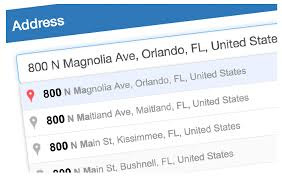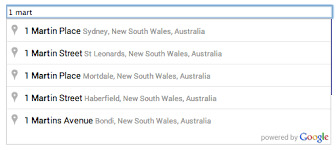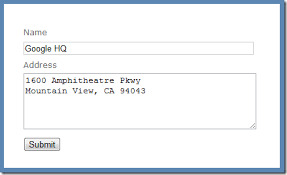Don't wanna be here? Send us removal request.
Text
Is Google Address Autocomplete API Free?
Google offers the Places Autocomplete API as part of its broader suite of location-based services. While the API does have a free tier, usage limits and pricing apply beyond certain thresholds. Here's a breakdown of the key points regarding the cost of Google's Address Autocomplete API:

1. Free Tier
Google's Places Autocomplete API offers a limited free tier that allows developers to make a certain number of requests per month at no cost.
The free tier is subject to usage quotas, which means if your application exceeds these limits, you may incur charges.
2. Pricing Structure
Beyond the free tier, Google charges for additional usage based on the number of requests made.
The pricing varies based on the number of autocomplete requests, with different rates for basic and premium usage levels.
3. Billing and Usage Limits
Google provides a billing dashboard where developers can monitor their API usage and associated costs.
It's important to set up billing information to avoid service disruptions once the free tier limits are exceeded.
4. Enterprise Options
For high-volume applications or specific enterprise needs, Google offers custom pricing and service level agreements (SLAs).
Enterprise customers can negotiate pricing based on usage forecasts and additional support requirements.
Determining Cost for Your Application
To estimate the potential cost of using Google's Address Autocomplete API:
Review the current pricing structure on Google's Cloud Platform website.
Consider the projected usage of your application to assess whether the free tier will suffice or if additional costs may apply.
Factor in any specific requirements such as enterprise-level support or enhanced usage limits.
Alternatives to Consider
If cost is a concern or if your application requires specific features not offered by Google's API, explore alternative address autocomplete APIs like Algolia, Mapbox, SmartyStreets, or Here, which may offer different pricing models and feature sets.
In summary, while Google's Address Autocomplete API does have a free tier, developers should be aware of usage limits and potential costs associated with exceeding these limits. Understanding the pricing structure and exploring alternative APIs can help in making informed decisions based on your project's requirements and budget.
youtube
SITES WE SUPPORT
API To Verify Addresses – Wix
0 notes
Text
What is the Best API for Address Autocomplete?
Address autocomplete APIs have become crucial tools for enhancing user experience and accuracy in applications involving address input. These APIs provide real-time suggestions and auto-completion of addresses based on user input, streamlining the checkout process, form filling, and location searches. Choosing the best API for address autocomplete depends on various factors such as accuracy, coverage, ease of integration, and cost. Here's a detailed look at some of the top contenders in this space:

1. Google Places Autocomplete API
Key Features: Google's API offers comprehensive address predictions based on a user's input. It covers a wide range of countries and supports various address formats.
Pros: High accuracy, extensive coverage, and detailed place information.
Cons: Usage costs can escalate with large volumes, and there are usage limits for free tiers.
2. Algolia Places API
Key Features: Algolia's API provides fast and relevant address autocomplete results. It's easy to integrate and offers customizable search features.
Pros: Fast response times, straightforward integration, and generous free tier.
Cons: May require additional configuration for certain advanced features.
3. Mapbox Geocoding API
Key Features: Mapbox offers a geocoding API that includes address autocomplete functionality. It's known for its mapping capabilities and spatial data services.
Pros: Detailed geospatial data, customizable mapping solutions.
Cons: May be more complex to set up compared to dedicated autocomplete APIs.
4. SmartyStreets API
Key Features: SmartyStreets specializes in address verification and validation. Their API provides accurate suggestions for US-based addresses.
Pros: Focus on address accuracy and validation.
Cons: Limited international coverage compared to global APIs like Google's.
5. Here Geocoding & Search API
Key Features: Here offers a powerful geocoding and search API that includes address autocomplete functionality. It covers a wide range of countries and supports various languages.
Pros: Detailed mapping data, good international coverage.
Cons: Pricing can be higher for large-scale usage.
Choosing the Right API
Selecting the best address autocomplete API depends on your project's specific requirements. Factors to consider include:
Accuracy: How well does the API predict and validate addresses?
Coverage: Does the API support the countries and regions relevant to your application?
Cost: Consider the pricing structure, including free usage tiers and potential scaling costs.
Ease of Integration: Evaluate how straightforward it is to integrate and customize the API within your application.
In conclusion, the "best" API for address autocomplete varies based on your project's needs. Google Places Autocomplete API is a popular choice due to its extensive coverage and reliability, but alternatives like Algolia, Mapbox, SmartyStreets, and Here offer compelling features tailored to different use cases and regions.
youtube
SITES WE SUPPORT
API To Verify Addresses – Wix
0 notes
Text
Address Parsing and Standardization
Address parsing and standardization are fundamental processes in data management, particularly for businesses dealing with customer information, logistics, and marketing. An Address Parsing and Standardization API provides a systematic way to break down address data into its components, correct errors, and ensure adherence to postal standards. This article explores the importance and mechanics of address parsing and standardization using APIs.

Address Parsing
Address parsing involves breaking down a complete address string into individual components such as street number, street name, city, state, postal code, and country. Parsing algorithms within an Address Parsing API use pattern recognition and linguistic analysis to identify and extract these components accurately from unstructured or partially formatted address data.
Address Standardization
Once address components are parsed, the next step is standardization. Address Standardization APIs validate and correct each component to comply with postal authority guidelines. This includes formatting street names, abbreviating directionals and suffixes, verifying city and state names, and ensuring proper postal code formats. Standardization ensures uniformity and consistency in address data, reducing errors and improving delivery accuracy.
How Address Parsing and Standardization APIs Work
Input: The API receives raw address data, which may vary in format and quality.
Parsing: The API analyzes the address string, identifying individual components such as street, city, state, and postal code.
Validation: Each component is validated against reference datasets to ensure accuracy and completeness.
Correction: Errors like misspellings or incomplete data are corrected based on standardized rules and address databases.
Standardization: The API formats and structures the address according to postal guidelines, making it uniform and reliable.
youtube
SITES WE SUPPORT
API To Verify Addresses – Wix
0 notes
Text
Autocomplete and Cleanse Your Mailing Addresses Lists with Address Validation API
In the realm of customer data management and logistics, maintaining accurate and standardized mailing addresses is paramount. An Address Validation API offers a comprehensive solution to autocomplete and cleanse address lists, ensuring data quality and efficiency in various business operations. This article delves into the functionalities and benefits of using an Address Validation API for mailing address optimization.

Address Autocompletion
One of the key features of an Address Validation API is its ability to autocomplete addresses in real-time. As users start typing their address, the API suggests matching addresses based on its database, minimizing errors and speeding up data entry. This autocomplete functionality utilizes predictive algorithms to anticipate and validate addresses accurately.
Address Cleansing and Standardization
Address cleansing involves identifying and correcting inconsistencies or errors within mailing lists. An Address Validation API analyzes each address for completeness, accuracy, and validity. It standardizes address formats according to postal guidelines, correcting misspellings, abbreviations, and missing components (such as ZIP codes or apartment numbers). By cleansing addresses, businesses can eliminate duplicate entries and maintain a clean, reliable database.
Benefits of Using Address Validation API for Mailing Addresses:
Enhanced Data Quality: Ensures that mailing lists are accurate and up-to-date, minimizing returned mail and delivery issues.
Time Efficiency: Reduces manual effort in address verification and cleansing, enabling faster processing of large datasets.
Cost Savings: Optimizes mailing operations by reducing postage costs associated with undeliverable mail.
Improved Customer Communication: Enables personalized marketing campaigns and effective customer correspondence with validated addresses.
Application in E-commerce and Marketing
For e-commerce businesses, an Address Validation API plays a critical role in improving checkout experiences and minimizing shipping errors. By integrating address validation during checkout, businesses can reduce cart abandonment rates caused by address entry issues. Similarly, in marketing campaigns, accurate addresses enable targeted mailings and better engagement with customers.
Implementation Considerations
When implementing an Address Validation API for mailing address optimization, businesses should consider factors such as API scalability, data security, and compatibility with existing systems. Choosing a reliable API provider with a robust address database and flexible integration options is essential for achieving optimal results.
Conclusion
In summary, leveraging an Address Validation API for autocompleting and cleansing mailing addresses offers significant benefits to businesses across industries. By ensuring data accuracy, reducing operational costs, and enhancing customer interactions, businesses can achieve greater efficiency and competitiveness in their operations. The use of address validation technology represents a proactive approach towards data quality management, essential for success in today's data-driven business landscape.
youtube
SITES WE SUPPORT
API To Verify Addresses – Wix
0 notes
Text
How Does Address Verification API Work?
In the digital age, accurate address verification is crucial for businesses across various sectors, from e-commerce and logistics to finance and healthcare. An Address Verification API (Application Programming Interface) plays a vital role in ensuring that addresses collected from customers or users are correct, standardized, and complete. This article explores the workings of an Address Verification API, its benefits, and its impact on businesses.

What is an Address Verification API?
An Address Verification API is a software interface that enables automated validation and standardization of postal addresses. It integrates directly into applications or websites, allowing real-time address verification during data entry or batch processing. The API utilizes comprehensive address databases and algorithms to verify, correct, and enhance address data.
How Does it Work?
Data Input: The API receives address data in various formats—entered manually through a web form or uploaded in bulk from databases.
Parsing: The API parses the address components such as street name, city, state, postal code, and country.
Validation: Each component is validated against a reference database containing accurate address data. The API checks for correct postal formats, valid city names, and existing street addresses.
Correction: If any part of the address is incomplete or incorrect, the API suggests corrections or completes missing details based on standardized data.
Standardization: The API standardizes the address format according to postal authority guidelines, ensuring uniformity and accuracy.
Enrichment: Additional data such as latitude, longitude, time zone, or demographic information may be added to enhance address details.
Output: The API returns validated, standardized addresses back to the application in real-time or as a batch process.
Benefits of Address Verification API:
Data Accuracy: Ensures that addresses are valid and accurate, reducing delivery errors and returned mail.
Time and Cost Savings: Automates the address validation process, saving time and resources compared to manual verification.
Improved Customer Experience: Prevents address-related issues during online transactions, leading to smoother operations and increased customer satisfaction.
Regulatory Compliance: Helps businesses comply with postal regulations and data protection laws by maintaining accurate customer records.
Use Cases:
E-commerce: Prevents shipment delays and improves order fulfillment by verifying customer addresses at checkout.
Finance: Reduces risks associated with incorrect addresses in loan applications, billing, and account management.
Logistics: Optimizes delivery routes and reduces undeliverable packages, saving costs for logistics companies.
Conclusion
In conclusion, an Address Verification API is a powerful tool for businesses seeking to enhance the quality and reliability of their address data. By integrating address validation into their systems, organizations can streamline operations, reduce costs, and provide better services to customers. The API's ability to parse, standardize, and enrich address information ensures that businesses maintain accurate databases essential for success in today's competitive landscape.
youtube
SITES WE SUPPORT
API To Verify Addresses – Wix
1 note
·
View note